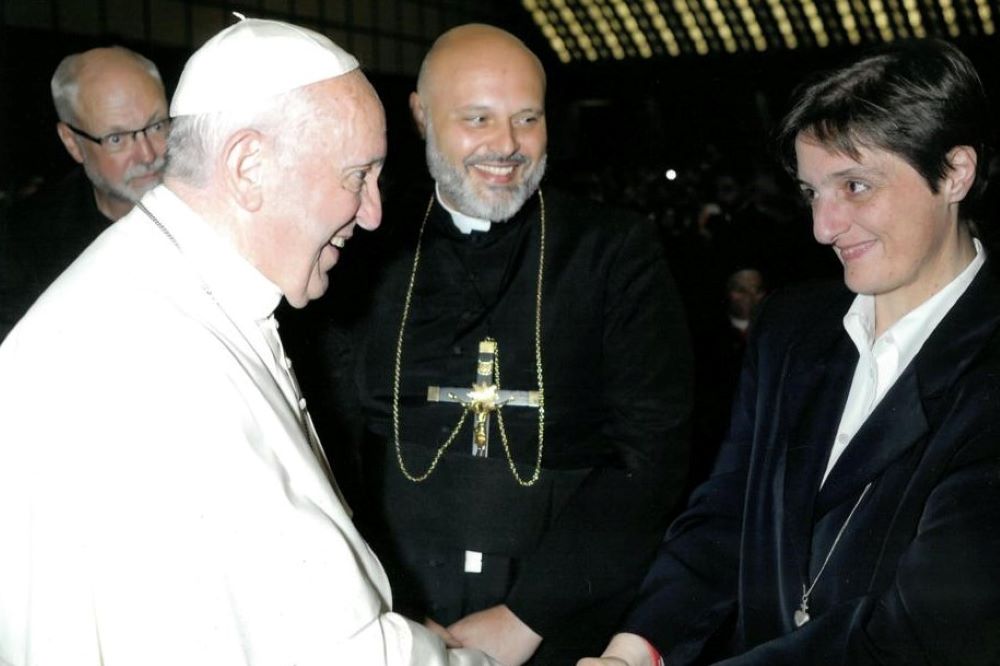
Sr. Nadia Coppa greets Pope Francis during an audience with the Family of the Precious Blood June 30, 2018. She has been superior general of the Adorers of the Blood of Christ since 2017 and was elected president of the International Union of Superiors General in 2022. (Courtesy of the Adorers of the Blood of Christ.)
Editor's note: Today marks 10 years of Pope Francis' papacy. This week, leaders of four organizations of women religious reflect in columns for Global Sisters Report on what his leadership has meant, particularly for women religious. Read more about Pope Francis' 10th anniversary from the National Catholic Reporter.

Pope Francis was elected 10 years ago today. It's been 10 years characterized by a dynamism that only the Holy Spirit could generate. Through his magisterium, Pope Francis has promoted important changes within the church, brought a new breath to the ecclesial path and launched innovative reflection processes that open wide horizons for the future.
For this jubilee, numerous publications will recount the richness of his magisterium and emphasize the prophetic vision with which he is leading the church. Among the many topics, his relationship with women and their role in society and in the church represent an especially interesting theme.
A modern and democratic society should always recognize women's right to be actively involved in political and ecclesial life, acknowledging their contribution not only in their choices, but in the unique way they implement them.
As I listen to and observe Pope Francis, it strikes me that his relationship with the female world is based on a strong empathy, stemming from the rich relational experience that has characterized his family life and his ministry as priest and bishop. His Latin American origin, welcoming and spontaneous, makes the pontiff capable of proximity, sensitivity and profound humanity.
On several occasions, he has underlined the need for women to take a more active role in the church and society — not based on their claim for equal rights and uniformity, which would eliminate the valuable differences between men and women — but because of the richness of women's different approaches to life.
Since the beginning of his pontificate, in his first apostolic exhortation, Evangelii Gaudium ("The Joy of the Gospel"), Pope Francis emphasized that the church is called to a more decisive commitment in recognizing the feminine genius. He said:
The Church acknowledges the indispensable contribution which women make to society through the sensitivity, intuition and other distinctive skill sets which they, more than men, tend to possess. I think, for example, of the special concern which women show to others, which finds a particular, even if not exclusive, expression in motherhood. … But we need to create still broader opportunities for a more incisive female presence in the Church. Because "the feminine genius is needed in all expressions in the life of society, the presence of women must also be guaranteed in the workplace" and in the various other settings where important decisions are made, both in the Church and in social structures.
Pope Francis listens during an audience with participants in the plenary assembly of the women's International Union of Superiors General at the Vatican May 5, 2022. (CNS photo/Vatican Media)
What is striking about Pope Francis is his understanding of the female world, his constant appreciation and desire to see women express their distinctive traits. Every woman is different, but all possess the innate vocation and commitment toward placing the human being at the center of their attention. In family, religious and professional life, women are acknowledged for their ability to open space for others by creating opportunities for authentic and generative hospitality.
Pope Francis is very committed to raising awareness in different cultures for women to be taken into greater consideration, empowering them as protagonists and promoters of choices that lead to real social transformation. They are capable of transmitting values that are the essence of life and, with their introspective capacity, they are able to interpret events by giving them new meanings, identifying concrete ways to reach solutions.
"Women are able to see things differently than men. Women can ask questions that we men just don't get," he said in a 2015 meeting with youth at St. Thomas University in Manila. This conviction stems from his awareness, shared at the 2016 International Union of Superiors General meeting, that "the Church is feminine; the Church is woman …" That is why the presence of women in church life is not a mere feminist claim, but a right, stemming from baptism and the charisms that the Holy Spirit inspires.
There are very "maternal" tasks that women perform in the church: serving the poor and the marginalized, accompanying the sick, caring for children and raising awareness about creation. Their gifts and distinctive traits are an essential element of the ministry of mercy, which according to Pope Francis is the most urgent task of the church "going out" toward existential peripheries.
A church open to care, interpersonal relationships and proximity can draw such richness and dynamism from the exquisitely feminine ability to experience human relationships not as a means, but as an end. Because of their emotional depth, their attention to the present as kairos, and their ability to seize aspects of reality that escape deductive logic by capturing life's hidden secrets, women broaden ecclesial paths as we grow as the people of God.
Pope Francis believes women excel in their ability to create communion, foster networks of collaboration and inclusiveness — acting as mediators, bearers of values, living with unbiased and unconditional love.
'Think about a Church without sisters! It is unthinkable.'
—Pope Francis
The virtue of tenderness that characterizes the female world encourages everyone to follow this path that speaks the language of tenderness, silence and compassion. It also requires passion and unconditional gratuity to become brothers and sisters and humbly embrace our humanity.
When speaking of women in the church, one cannot fail to think of women religious and the appreciation that the pontiff has always shown for consecrated women. Throughout the centuries, we have dedicated our lives to the service of the weak and the poor in the name of the Gospel and have made the search for Jesus Christ the motivation of our existence.
For Pope Francis, women religious are pillars of the church. "Think about a Church without sisters!" he said in his Feb. 2, 2014, Angelus address. "It is unthinkable: they are this gift, this leaven that carries forward the People of God. These women who consecrate their life to God, who carry forward Jesus' message, are great."
Over these 10 years, the dialogue between Pope Francis and consecrated women has been open and sincere. Since 2015, the year dedicated to consecrated life, dialogue with superiors general has generated a dynamic space for reflection on important issues affecting religious life. Topics include the possibility of the female diaconate, care for initial formation, interculturality as an expression of the synodal path and the sensitive issue of abuses.
Advertisement
This opportunity revealed the pontiff's desire to embrace the demands of religious life and women's wisdom, allowing his thought and vision to emerge. A vivid memory is his commitment to be a voice for religious women who, in some parts of the world, still experience the frustration and humiliation of clerics treating them as servants. He addressed this at the 2016 UISG meeting: "When a consecrated woman is asked to perform a work of servitude, the life and dignity of that woman are demeaned. Her vocation is service: service to the Church. But not servitude!"
These strong and clear words highlight the need to continue fighting for the dignity of women religious and the need for respectful, fair and correct cooperation.
It is worth mentioning the encouragement Pope Francis has given to the Talitha Kum project, the international network against human trafficking promoted by the UISG. He encourages and admires the nuns who network and fight against trafficking, a scourge that wounds humanity. The 2019 Synod of Bishops for the Pan-Amazon region, finally, opened a wide space for women, highlighting that never before in Francis' pontificate has the debate on women and about women been so relevant.
Thanks to his prophetic vision, Pope Francis has not hesitated to increase the areas of women's participation in ecclesial bodies by entrusting them with roles of responsibility, including in decision-making processes. The appointment of several women to important positions within the church and the decision to give them visibility is very encouraging and brings a further element to the synodal path we are called to undertake.
There is still some way to go, but the step has been set in motion with resolve and prophetic courage.
Thank you, Pope Francis.







